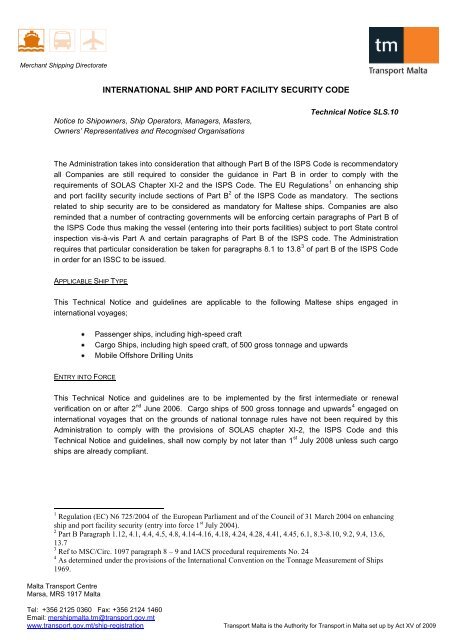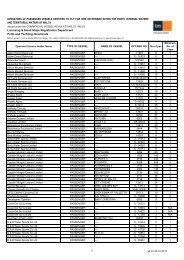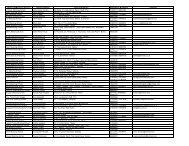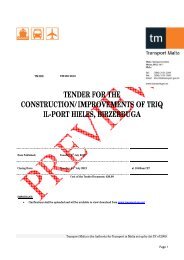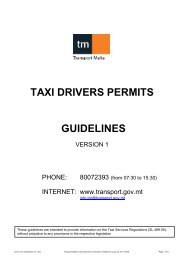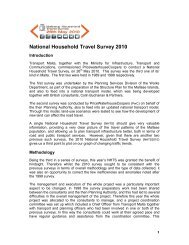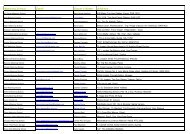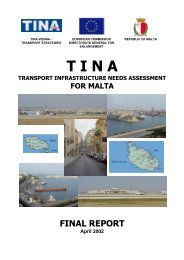international ship and port facility security code - Transport Malta
international ship and port facility security code - Transport Malta
international ship and port facility security code - Transport Malta
Create successful ePaper yourself
Turn your PDF publications into a flip-book with our unique Google optimized e-Paper software.
Merchant Shipping Directorate<br />
<strong>Malta</strong> Trans<strong>port</strong> Centre<br />
Marsa, MRS 1917 <strong>Malta</strong><br />
INTERNATIONAL SHIP AND PORT FACILITY SECURITY CODE<br />
Notice to Shipowners, Ship Operators, Managers, Masters,<br />
Owners’ Representatives <strong>and</strong> Recognised Organisations<br />
Technical Notice SLS.10<br />
The Administration takes into consideration that although Part B of the ISPS Code is recommendatory<br />
all Companies are still required to consider the guidance in Part B in order to comply with the<br />
requirements of SOLAS Chapter XI-2 <strong>and</strong> the ISPS Code. The EU Regulations 1 on enhancing <strong>ship</strong><br />
<strong>and</strong> <strong>port</strong> <strong>facility</strong> <strong>security</strong> include sections of Part B 2 of the ISPS Code as m<strong>and</strong>atory. The sections<br />
related to <strong>ship</strong> <strong>security</strong> are to be considered as m<strong>and</strong>atory for Maltese <strong>ship</strong>s. Companies are also<br />
reminded that a number of contracting governments will be enforcing certain paragraphs of Part B of<br />
the ISPS Code thus making the vessel (entering into their <strong>port</strong>s facilities) subject to <strong>port</strong> State control<br />
inspection vis-à-vis Part A <strong>and</strong> certain paragraphs of Part B of the ISPS <strong>code</strong>. The Administration<br />
requires that particular consideration be taken for paragraphs 8.1 to 13.8 3 of part B of the ISPS Code<br />
in order for an ISSC to be issued.<br />
APPLICABLE SHIP TYPE<br />
This Technical Notice <strong>and</strong> guidelines are applicable to the following Maltese <strong>ship</strong>s engaged in<br />
<strong>international</strong> voyages;<br />
ENTRY INTO FORCE<br />
Passenger <strong>ship</strong>s, including high-speed craft<br />
Cargo Ships, including high speed craft, of 500 gross tonnage <strong>and</strong> upwards<br />
Mobile Offshore Drilling Units<br />
This Technical Notice <strong>and</strong> guidelines are to be implemented by the first intermediate or renewal<br />
verification on or after 2 nd June 2006. Cargo <strong>ship</strong>s of 500 gross tonnage <strong>and</strong> upwards 4 engaged on<br />
<strong>international</strong> voyages that on the grounds of national tonnage rules have not been required by this<br />
Administration to comply with the provisions of SOLAS chapter XI-2, the ISPS Code <strong>and</strong> this<br />
Technical Notice <strong>and</strong> guidelines, shall now comply by not later than 1 st July 2008 unless such cargo<br />
<strong>ship</strong>s are already compliant.<br />
1<br />
Regulation (EC) N6 725/2004 of the European Parliament <strong>and</strong> of the Council of 31 March 2004 on enhancing<br />
<strong>ship</strong> <strong>and</strong> <strong>port</strong> <strong>facility</strong> <strong>security</strong> (entry into force 1 st July 2004).<br />
2<br />
Part B Paragraph 1.12, 4.1, 4.4, 4.5, 4.8, 4.14-4.16, 4.18, 4.24, 4.28, 4.41, 4.45, 6.1, 8.3-8.10, 9.2, 9.4, 13.6,<br />
13.7<br />
3<br />
Ref to MSC/Circ. 1097 paragraph 8 – 9 <strong>and</strong> IACS procedural requirements No. 24<br />
4<br />
As determined under the provisions of the International Convention on the Tonnage Measurement of Ships<br />
1969.<br />
Tel: +356 2125 0360 Fax: +356 2124 1460<br />
Email: mer<strong>ship</strong>malta.tm@trans<strong>port</strong>.gov.mt<br />
www.trans<strong>port</strong>.gov.mt/<strong>ship</strong>-registration Trans<strong>port</strong> <strong>Malta</strong> is the Authority for Trans<strong>port</strong> in <strong>Malta</strong> set up by Act XV of 2009
Merchant Shipping Directorate<br />
DEFINITIONS<br />
Technical Notice SLS.10<br />
Page 2 of 14<br />
Administration for the purposes of this notice the term Administration shall mean the Merchant<br />
Shipping Directorate of Trans<strong>port</strong> <strong>Malta</strong>.<br />
Drill means a training event that tests at least one component of the <strong>ship</strong> <strong>security</strong> plan <strong>and</strong> is used to<br />
maintain a high level of <strong>security</strong> readiness.<br />
Emergency response services means the medical, paramedical <strong>and</strong> ambulance personnel, fire <strong>and</strong><br />
rescue personnel, <strong>and</strong> at sea Search <strong>and</strong> Rescue (SAR) units responding to or participating in SAR<br />
operations.<br />
Exercise means a comprehensive training event that involves several of the functional elements of the<br />
<strong>ship</strong> <strong>security</strong> plan <strong>and</strong> tests communications, coordination, resource availability, <strong>and</strong> response.<br />
Failure means an observed situation where objective evidence indicates the non-fulfilment of a<br />
specified requirement of the ISPS Code <strong>and</strong> this Technical Notice.<br />
Public authorities 5 means the agencies or officials in a State responsible for the application <strong>and</strong><br />
enforcement of the laws, regulations, orders <strong>and</strong> decrees of that State.<br />
LIST OF ABBREVIATIONS<br />
5 IMO MSC/Circ. 1156<br />
CSO Company Security Officer<br />
CSR Continuous Synopsis Record<br />
DOS Declaration of Security<br />
IMO International Maritime Organization<br />
ISM International Safety Management<br />
ISSC International Ship Security Certificate<br />
PFSO Port Facility Security Officer<br />
RSO Recognized Security Organization<br />
SMS Safety Management System<br />
SSA Ship Security Assessment<br />
SSO Ship Security Officer<br />
SSP Ship Security Plan
Merchant Shipping Directorate<br />
1) SETTING OF SECURITY LEVEL<br />
Technical Notice SLS.10<br />
Page 3 of 14<br />
The setting of <strong>security</strong> level for Maltese <strong>ship</strong>s is the responsibility of this Administration. The<br />
Administration will communicate the <strong>security</strong> level information as <strong>and</strong> when deemed necessary to the<br />
Company by MS Notices. Whenever a higher <strong>security</strong> is set by this Administration, the CSO shall<br />
confirm the change in the <strong>security</strong> level onboard <strong>ship</strong>s falling under his/her responsibility, furthermore<br />
the CSO shall notify the Administration of <strong>security</strong> related matters that may affect the <strong>security</strong> level<br />
onboard.<br />
2) RECOGNIZED SECURITY ORGANIZATIONS<br />
The following RSOs have been authorized to act for <strong>and</strong> on behalf of the Administration, to approve<br />
SSPs <strong>and</strong> carry out verification <strong>and</strong> certification on Maltese <strong>ship</strong>s in accordance with section 19.1 of<br />
Part A of the ISPS Code <strong>and</strong> the applicable requirements of SOLAS Chapter XI-2;<br />
American Bureau of Shipping,<br />
Bureau Veritas,<br />
China Classification Society,<br />
Class NK,<br />
Det Norske Veritas,<br />
Germanischer Lloyd,<br />
Polish Register of Shipping<br />
Korean Register of Shipping,<br />
Lloyd’s Register of Shipping,<br />
Registro Italiano Navale,<br />
Russian Maritime Register of Shipping,<br />
RSOs shall require specific authorization prior to the ISPS verification <strong>and</strong> certification. A letter of<br />
authorization will be issued by this Administration on a <strong>ship</strong>-by-<strong>ship</strong> basis. The authorisation letter will<br />
be issued once <strong>and</strong> will be applicable for the initial audit <strong>and</strong> subsequent periodical/renewal audits<br />
including approval of the SSP.<br />
All RSOs must ensure that training of all their ISPS auditors conforms to the requirements of IACS<br />
Procedural Requirement 25.<br />
3) DURATION OF CERTIFICATE<br />
The validity of ISSC issued after the initial verification shall be for a period of not more than five years<br />
<strong>and</strong> subject to one intermediate verification <strong>and</strong> renewal verification by the end of the five-year period.<br />
If the Company wishes to harmonize the ISSC with the expiry date of the SMC issued in accordance<br />
with the ISM Code, the ISSC may be issued for a shorter period. Any additional verification shall be<br />
carried out as deemed necessary by the Administration or RSO.
Merchant Shipping Directorate<br />
4) INTERIM ISSC<br />
An Interim ISSC valid for six months shall be issued following;<br />
Technical Notice SLS.10<br />
Page 4 of 14<br />
SSA has been completed,<br />
The <strong>ship</strong> has been provided with the SSP,<br />
The SSP has been reviewed by the CSO <strong>and</strong> submitted for approval by RSO,<br />
The company <strong>and</strong> the <strong>ship</strong> are operating in accordance with the provisions of the plan.<br />
Necessary arrangements have been carried out for the maintenance of records, drills,<br />
crew familiarization, crew <strong>security</strong> training, internal audits, maintenance, calibration <strong>and</strong><br />
testing of <strong>security</strong> equipment, including the <strong>ship</strong> <strong>security</strong> alert system’<br />
At least one drill specified in the SSP has been either carried out or planned by the<br />
SSO/CSO before the <strong>ship</strong>’s departure.<br />
An interim ISSC may not be extended beyond the six months as stipulated in ISPS A/19.4.4. The<br />
issuance of subsequent consecutive interim ISSC shall only be considered by the Administration on a<br />
case-by-case basis following specific requests by RSO.<br />
5) REVISING ENTRIES ON THE ISSC<br />
In instances of change of particulars, additional verification will be carried out to confirm necessary<br />
amendments to <strong>security</strong> documentation.<br />
6) INVALIDATION OF THE ISSC<br />
In addition to ISPS Code Section A 19.3.8, the Administration may cancel or suspend an ISSC when;<br />
Remedial actions for failures set out at the intermediate or additional verification have not<br />
been completed within the agreed time period,<br />
The <strong>ship</strong> <strong>security</strong> plan has been amended without approval,<br />
The ISSC is to be reinstated upon satisfactory completion of verification in the scope of initial<br />
verification.<br />
7) FAILURES<br />
The ISSC will not be issued in cases where the initial or renewal <strong>security</strong> verification has identified, by<br />
objective evidence, failure(s) from the approved plan or requirements of SOLAS Chapter XI-2, ISPS<br />
Code <strong>and</strong> this Technical Notice. The RSO carrying out the verification is to inform the Administration<br />
<strong>and</strong> a copy of the Statement of Failure is to be forwarded to the Administration, to the company <strong>and</strong> to<br />
the <strong>ship</strong>. Even if the failure(s) does not compromise the <strong>ship</strong>’s ability to operate at <strong>security</strong> levels 1 to<br />
3, the ISSC will not be issued until the failure(s) has been rectified.<br />
In the case of a failure(s) that have been identified objectively during an intermediate or additional<br />
verification <strong>and</strong> which compromise the <strong>ship</strong>’s ability to operate at <strong>security</strong> levels 1 to 3, the failure(s)
Merchant Shipping Directorate<br />
Technical Notice SLS.10<br />
Page 5 of 14<br />
shall be re<strong>port</strong>ed immediately to the Administration by the RSO concerned. Unless identified<br />
failure(s) can be immediately rectified the company is to implement alternative <strong>security</strong> measures <strong>and</strong><br />
develop an action plan including time scale to address identified failure(s). The auditor shall verify the<br />
implementation of alternative measures before the <strong>ship</strong> sails. A copy of the Statement of Failure<br />
together with a full re<strong>port</strong> including company’s action plan is to be forwarded to the Administration. The<br />
Administration may request an additional verification to verify that the action plan has been completed.<br />
If the approved action plan is not followed or alternative arrangements not implemented, the<br />
Administration may withdraw the ISSC.<br />
In the case of failure(s) identified objectively during an intermediate or additional verification <strong>and</strong> which<br />
do not compromise the <strong>ship</strong>’s ability to operate at <strong>security</strong> levels 1 to 3, the failure(s) shall be re<strong>port</strong>ed<br />
immediately to the Administration by the RSO concerned. The company is to forward an action plan,<br />
detailing corrective measures including time scale for correction <strong>and</strong> any alternative <strong>security</strong> measures<br />
that will put in place to address the failure(s) identified. The completion of the action plan shall be<br />
verified no later than the next scheduled verification.<br />
8) CERTIFICATION AND VERIFICATION PROCESS<br />
Based on the initial authorization an ISSC may be issued subject to the following;<br />
The <strong>ship</strong> has an approved SSP,<br />
Satisfactory onboard initial verification by a RSO,<br />
The Company <strong>and</strong> the <strong>ship</strong> are operating in accordance with the provisions of the<br />
approved plan <strong>and</strong> that the <strong>ship</strong> <strong>security</strong> management system has been operating for at<br />
least two months from the date the SSP is logged as received onboard from the CSO.<br />
Operation in accordance with the provisions of the approved plan prior to certification<br />
should be verified on activity basis i.e. the RSO auditor should verify <strong>security</strong> related<br />
activities such as maintenance of records, drills, crew familiarization, crew <strong>security</strong> training<br />
<strong>and</strong> internal audits have been carried out. In addition maintenance, calibration <strong>and</strong> testing<br />
of <strong>security</strong> equipment, including the <strong>ship</strong> <strong>security</strong> alert system to be verified,<br />
All the technical equipment referenced in SSP has been verified,<br />
Satisfactorily operational <strong>security</strong> measures verified by sample audit of sufficient level<br />
necessary to asses the operating system in its entirety.<br />
Notification to the Administration of the designated CSO including contact details.<br />
The RSOs are to adopt IACS Procedural Requirements for ISPS Code Certification (IACS PR no. 24<br />
including no. 27 in case of transfer of certification).<br />
9) SHIP SECURITY ASSESSMENT<br />
The SSA is an integral part of the process of developing the SSP. Although provisions are made<br />
within the ISPS Code to develop a fleet <strong>security</strong> plan, the Administration requires that the plan for<br />
each <strong>ship</strong> reflects <strong>ship</strong>-specific information accurately. The only way to ensure that the information<br />
gathered during the SSA is accurate; the SSA is to be carried out by appropriately skilled personnel.
Merchant Shipping Directorate<br />
Technical Notice SLS.10<br />
Page 6 of 14<br />
Furthermore technical <strong>ship</strong> <strong>security</strong> information shall only be achieved by carrying out the on-scene<br />
<strong>security</strong> survey onboard each <strong>and</strong> every <strong>ship</strong> of the fleet, including sister <strong>ship</strong>s. A copy of the current<br />
SSA is to be retained onboard at all times. The Master <strong>and</strong>/or SSO shall ensure the protection of the<br />
SSA from unauthorized access.<br />
10) DEVELOPMENT OF SHIP SECURITY PLAN<br />
The Company may choose to develop the SSP (including the SSA) using adequately trained SSO<br />
<strong>and</strong>/or a Security Consultant <strong>and</strong>/or RSO.<br />
Within the ISPS Code no provisions are set for any RSO to assist in the development of the SSP<br />
(including the SSA). If a Company chooses to use a RSO to assist in the development of the plan,<br />
then that RSO shall not be authorized to approve the SSP or conduct the verification.<br />
In cases where the company has already adopted <strong>security</strong> procedures 6 within the safety management<br />
system of the <strong>ship</strong>, such established procedures are to be reviewed <strong>and</strong> if need be amended to reflect<br />
the requirements of Chapter XI-2 <strong>and</strong> Part A of the ISPS Code.<br />
It is recommended that such established procedures be incorporated within the SSP <strong>and</strong> not crossreferred<br />
within the SMS. This would provide smoother verification process of the SSP <strong>and</strong> such<br />
procedures would be protected from unauthorized access or disclosure.<br />
It is recommended by the Administration that procedures are to be included within the SSP to address<br />
circumstances when the <strong>ship</strong> is put out of service <strong>and</strong>/or the <strong>ship</strong> is undergoing conversion but still<br />
manned. Such procedures would also focus on revitalizing the <strong>ship</strong> <strong>security</strong> prior entry into service.<br />
Particular care shall be taken with regards the availability of sufficient personnel remaining onboard<br />
thereby ensuring that <strong>security</strong> duties outlined in the approved SSP are not compromised. Furthermore<br />
in the case when the <strong>ship</strong> is located in the <strong>ship</strong>yard the sharing of <strong>security</strong> responsibilities between the<br />
<strong>ship</strong> <strong>and</strong> the <strong>ship</strong>yard will have to be agreed <strong>and</strong> this involves the conclusion of a DOS.<br />
If the statutory certificates of the <strong>ship</strong>, including the ISSC, are suspended or revoked, responsibility for<br />
the <strong>security</strong> of the <strong>ship</strong> would, in practice, rest with the <strong>ship</strong>yard.<br />
The SSP shall establish, as applicable, details of the procedures <strong>and</strong> <strong>security</strong> measures the <strong>ship</strong><br />
should apply when:<br />
1. it is at a <strong>port</strong> of a State which is not a Contracting Government;<br />
2. it is interfacing with a <strong>ship</strong> to which the ISPS Code does not apply;<br />
3. it is interfacing with a fixed or floating platform or a mobile drilling unit on location;<br />
4. it is interfacing with a <strong>port</strong> or <strong>port</strong> <strong>facility</strong> which is not required to comply or which is not<br />
complying with chapter XI-2 <strong>and</strong> Part A of the ISPS Code;<br />
6 Example <strong>security</strong> procedures to address <strong>security</strong> related incidents such as stowaways, piracy <strong>and</strong> armed robbery<br />
<strong>and</strong> access of visitors.
Merchant Shipping Directorate<br />
Technical Notice SLS.10<br />
Page 7 of 14<br />
If the <strong>ship</strong>’s approved SSP does not already include provisions as listed in 1 to 4 above, the <strong>ship</strong><br />
should attempt to conclude a Declaration of Security or to take the following action:<br />
record the actions taken by the CSO <strong>and</strong>/or SSO to establish contact with the PFSO,<br />
<strong>and</strong>/or any other person(s) responsible for the <strong>security</strong> of the <strong>port</strong> <strong>and</strong>/or <strong>port</strong> <strong>facility</strong>, <strong>ship</strong><br />
or platform being interfaced;<br />
record the <strong>security</strong> measures <strong>and</strong> procedures put in place by the <strong>ship</strong>, bearing in mind the<br />
<strong>security</strong> level set by the Administration <strong>and</strong> any other available <strong>security</strong> related<br />
information; <strong>and</strong> complete <strong>and</strong> sign, on behalf of the <strong>ship</strong> alone, a DOS (particularly in<br />
circumstances when the <strong>ship</strong> is unable to identify the <strong>security</strong> person(s) responsible for a<br />
particular <strong>port</strong> <strong>facility</strong>);<br />
implement <strong>and</strong> maintain the <strong>security</strong> measures <strong>and</strong> procedures set out in the DOS<br />
throughout the duration of the interface;<br />
re<strong>port</strong> the actions taken to the CSO <strong>and</strong> through the CSO to the Administration; <strong>and</strong><br />
request the CSO to inform the authorities responsible for the exercise of control <strong>and</strong><br />
compliance measures (Regulation XI-2/9) <strong>and</strong> the PFSO(s) at the next <strong>port</strong>(s) of call of<br />
the difficulties the <strong>ship</strong> experienced <strong>and</strong> of the actions the <strong>ship</strong> itself took.<br />
additional to the above it is recommended that prior to departure from <strong>port</strong> facilities which<br />
do not comply with the requirements of the ISPS Code searches are carried out in<br />
accordance with the approved SSP. Such additional <strong>security</strong> measures are to be<br />
documented.<br />
Companies are reminded that during routine <strong>and</strong> normal <strong>ship</strong>/<strong>port</strong> interface <strong>and</strong> <strong>ship</strong>-to-<strong>ship</strong> activities<br />
it is usual for a variety of commercial, private <strong>and</strong> Governmental personnel to require access to a <strong>ship</strong>.<br />
Security requirements contained in SOLAS Chapter XI-2 <strong>and</strong> in the ISPS Code has been developed<br />
for the purpose of enhancing the <strong>security</strong> in the <strong>international</strong> maritime trans<strong>port</strong> sector <strong>and</strong> should not<br />
be used to delay or inhibit unnecessary or unjustifiably the access on board of public authorities <strong>and</strong><br />
emergency response services. The approved SSP does not create the right for either the <strong>ship</strong> or for<br />
those on board to invoke the provisions therein, <strong>and</strong> to claim, in any circumstance <strong>and</strong> regardless of<br />
what is required by the applicable <strong>security</strong> level, the authority to prevent any public authority from<br />
boarding the <strong>ship</strong> when that <strong>ship</strong> is within the territory of another SOLAS Contracting Government or<br />
of another State.<br />
11) COPIES OF THE APPROVED SHIP SECURITY PLAN<br />
The Administration requires that a copy of the endorsed SSP (including any amendments) be retained<br />
in the office(s) of the Company. The Company shall ensure the protection of the SSP against<br />
unauthorized access.
Merchant Shipping Directorate<br />
12) AMENDMENTS TO THE SHIP SECURITY PLAN<br />
Technical Notice SLS.10<br />
Page 8 of 14<br />
The following list identifies which changes to the SSP are to be forwarded to the RSO for approval.<br />
Procedures designed to prevent the carriage on board the <strong>ship</strong> of weapons, dangerous<br />
substances <strong>and</strong> devices intended for use against persons, <strong>ship</strong>s or <strong>port</strong>s;<br />
Identification of the restricted areas <strong>and</strong> measures for the prevention of unauthorized<br />
access;<br />
Procedures for responding to <strong>security</strong> threats or breaches of <strong>security</strong>, including provisions<br />
for maintaining critical operations of the <strong>ship</strong> or <strong>ship</strong>/<strong>port</strong> interface;<br />
Procedures for responding to any <strong>security</strong> instructions that Contracting Governments may<br />
issue whilst at <strong>security</strong> level 3;<br />
Procedures for auditing <strong>security</strong> activities;<br />
Procedures for associated training, drills <strong>and</strong> exercises;<br />
Procedures for interfacing with <strong>port</strong> <strong>facility</strong> <strong>security</strong> activities;<br />
Procedures for the periodic review <strong>and</strong> updating;<br />
Procedures for re<strong>port</strong>ing <strong>security</strong> incidents;<br />
Procedures to ensure the inspection, testing, calibration <strong>and</strong> maintenance of any <strong>security</strong><br />
equipment provided on board;<br />
Procedures, instructions <strong>and</strong> guidance on the use of the <strong>ship</strong> <strong>security</strong> alert system,<br />
including the testing, activation, deactivation <strong>and</strong> resetting <strong>and</strong> to limit false alerts;<br />
Procedures relating to <strong>security</strong> record keeping;<br />
Procedures aimed at preventing unauthorized access/disclosure, deletion, destruction or<br />
amendment;<br />
Procedures relating to the delivery of the <strong>ship</strong>’s stores;<br />
Those amendments, which significantly alter or change the <strong>security</strong> management system on board,<br />
shall be subject to an additional verification audit by the RSO.<br />
13) INTERNAL AUDITS<br />
Internal audits of <strong>security</strong> activities are to be carried out at least annually. Internal audits are not to be<br />
carried out by the personnel responsible of the activities being audited.<br />
14) TRAINING OF COMPANY SECURITY OFFICER AND SHIP SECURITY OFFICER<br />
ISPS B/13.1 to 13.8 provides guidance on the <strong>security</strong> training required for the CSO, SSO <strong>and</strong> shore<br />
based Company personnel.<br />
It is the responsibility of the Company to ensure that Company Security Officer(s), other appropriate<br />
shore based personnel <strong>and</strong> Ship Security Officer(s) are to receive the appropriate training.
Merchant Shipping Directorate<br />
Technical Notice SLS.10<br />
Page 9 of 14<br />
The Guidelines on Training <strong>and</strong> Certification for Company Security Officers (IMO MSC/CIRC. 1154)<br />
are to be considered as the minimum requirements 7 in relation to the level of knowledge sufficient to<br />
enable a person to act as the designated CSO.<br />
Ship Security Officers serving on board <strong>ship</strong> are required to be in possession of a Certificate of<br />
Proficiency issued in accordance with Regulation VI/5 of the International Convention on St<strong>and</strong>ards of<br />
Training, Certification <strong>and</strong> Watchkeeping for Seafarers (STCW), 1978 <strong>and</strong> Section A-VI/5 of the STCW<br />
Code which sets out the specifications of minimum st<strong>and</strong>ards of proficiency for SSOs.<br />
It is the onus of the Company to select a training method suitable for the training of personnel involved<br />
in <strong>security</strong> matters. If the Company determines that in house training will be conducted by the CSO, it<br />
is recommended that CSO attends a “train the trainer” course.<br />
Documentary evidence of any training attended/received or any training carried out is to be available,<br />
in particularly the training provided to the Ship Security Officer.<br />
Companies are reminded that Paragraph B/4.33 indicates that lack of training could give rise to clear<br />
grounds under Regulations XI-2/9.1 <strong>and</strong> XI-2/9.2. The ISSC is considered prima facie evidence that<br />
the required training as identified in MSC/Circ. 1097 has been provided to the crew. However, if a Port<br />
State Control Officer detects a lack of training action could be taken resulting in the detainment of the<br />
vessel.<br />
Training of shore based <strong>and</strong> <strong>ship</strong>board personnel is crucial.<br />
This Technical Notice vis-à-vis the required <strong>security</strong> knowledge of the <strong>ship</strong>board personnel at the<br />
stage of the initial verification, the Company must ensure that those concerned underst<strong>and</strong> their role<br />
<strong>and</strong> responsibilities <strong>and</strong> have enough knowledge for performing the <strong>ship</strong> <strong>security</strong> duties as outlined in<br />
SOLAS Chapter XI-2, the ISPS Code <strong>and</strong> in the approved SSP.<br />
Key members of the <strong>ship</strong>’s personnel shall be able to communicate effectively with each other <strong>and</strong><br />
that no communication barrier exists.<br />
15) DESIGNATION OF THE COMPANY SECURITY OFFICER<br />
In meeting its obligations in respect of the provisions contained in ISPS A/11 the Company shall not<br />
outsource responsibilities of the CSO to third parties. It is to be borne in mind that the position of the<br />
CSO is a 24-hour responsibility. The Company must have the necessary arrangements to ensure that<br />
a line of communication (directly or indirectly) exists between the CSO <strong>and</strong> the <strong>ship</strong> on a 24-hour<br />
basis. The Company must complete <strong>and</strong> submit the form outlined in Annex I of this Technical Notice,<br />
providing information with regards to the designated CSO.<br />
7 By not later than 1 st July 2009
Merchant Shipping Directorate<br />
16) SELECTING A SHIP SECURITY OFFICER<br />
Technical Notice SLS.10<br />
Page 10 of 14<br />
Any member of the <strong>ship</strong>’s personnel, including the Master, may be designated as the SSO, provided<br />
that the selected member of the <strong>ship</strong>’s personnel is duly trained <strong>and</strong> has a sound underst<strong>and</strong>ing of his<br />
duties <strong>and</strong> responsibilities. Consideration needs to be given in relation to crew size. On <strong>ship</strong>s with a<br />
small crew the Master may be the most appropriate choice to be designated as the SSO.<br />
Companies are reminded that it is a fundamental requirement that the SSO should be familiar with the<br />
<strong>security</strong> arrangements of the specific <strong>ship</strong> on which the SSO serves. In cases where the serving SSO<br />
is replaced it is the responsibility of the Company to ensure that the replacing SSO has the op<strong>port</strong>unity<br />
to familiarize himself with the particular <strong>ship</strong> <strong>and</strong> the approved SSP.<br />
It is prudent to point out that the workload presented to the <strong>ship</strong> personnel through the development<br />
<strong>and</strong> implementation of the SSP should not infringe hours of rest, which could promulgate fatigue.<br />
Notwithst<strong>and</strong>ing the requirements of the minimum safe manning certificate, the Company shall ensure<br />
that sufficient number of personnel is onboard to implement the <strong>security</strong> measures outlined in the<br />
SSP. Human resource availability shall be evaluated during the SSA.<br />
In cases where the SSO is explicitly identified in the SSP, Company procedures shall be in place to<br />
amend such details when change of SSO occurs.<br />
17) DECLARATION OF SECURITY<br />
Unless specifically instructed otherwise by the Administration, CSO or SSO, the Master is not obliged<br />
to complete the DOS when the <strong>ship</strong>, <strong>port</strong> <strong>facility</strong> or other <strong>ship</strong> covered by the ISPS Code, are<br />
operating at Security Level 1. Section A/5.2 of the ISPS Code specifies instances when a <strong>ship</strong> can<br />
request completion of a DOS.<br />
18) DRILLS AND EXERCISES<br />
To ensure the effective implementation of the provisions of the SSP, the Administration requires that<br />
<strong>security</strong> drills should be conducted at least once every three months. In addition, in cases where more<br />
than 25% of the <strong>ship</strong>’s personnel have been changed, at any one time, with personnel that have not<br />
previously participated in any drill on that <strong>ship</strong> within the last 3 months, a drill should be conducted<br />
within one week of the change. A tabletop <strong>security</strong> exercise, which would include the involvement of a<br />
<strong>port</strong> <strong>facility</strong> <strong>and</strong>/or the Company, shall be carried out once a year. The SSAS shall be tested at least<br />
twice a year. Security training <strong>and</strong> drills shall be reflected in the <strong>ship</strong>’s training <strong>and</strong> drill programme.<br />
All drills carried out are to be recorded accordingly.
Merchant Shipping Directorate<br />
19) RECORD KEEPING<br />
The documentary evidence <strong>and</strong> records, which need to be maintained, are specified in:<br />
Regulation XI-2/5;<br />
Regulation XI-2/9.2.1;<br />
Section A/10;<br />
Section A/5;<br />
Technical Notice SLS.10<br />
Page 11 of 14<br />
The Administration requires that all records identified above, including all verification records, shall be<br />
maintained by the Company <strong>and</strong> the <strong>ship</strong> for a period of three (3) years.<br />
Bearing in mind the provisions of SOLAS Regulation XI-2/9.2.3 the DOS shall be kept onboard for a<br />
minimum period of three (3) years.<br />
20) LAID UP SHIPS<br />
In the case of a <strong>ship</strong> that is laid up the validity of the ISSC depends on the <strong>ship</strong>’s manning level but as<br />
a general rule Companies are to note the following:<br />
If lay-up is for a period of not more than three (3) months, a <strong>security</strong> drill must be carried<br />
out within one week of re-entry into service. Additional requirements may be stipulated by<br />
the Administration as deemed necessary on a case-by-case basis;<br />
If lay-up is for a period exceeding three (3) month but not more twelve (12) months, the<br />
RSO is required to carry out prior to re-entry into service an additional verification for the<br />
purpose of ensuring that the <strong>security</strong> system remains valid <strong>and</strong> in full compliance with the<br />
ISPS Code. The additional verification is to be reflected by endorsement of the ISSC.<br />
If lay-up period is for over 12 months, interim certification is required <strong>and</strong> the SSP is to be<br />
approved prior to re-entry into service.<br />
21) SECURITY EQUIPMENT<br />
The Administration does not require any specific <strong>security</strong> equipment to be provided on board Maltese<br />
<strong>ship</strong>s, but the outcome of the SSA could result in the need of <strong>security</strong> equipment to be fitted or<br />
provided onboard. During the fitting of <strong>security</strong> equipment <strong>and</strong> related electrical installations, the<br />
Company shall give due consideration to the safety issues highlighted by SOLAS Regulation II-1/45.<br />
Security equipment provided is to be clearly identified in the SSP <strong>and</strong> procedures have to be included<br />
therein for the operation, maintenance, calibration <strong>and</strong> testing of the <strong>security</strong> equipment.<br />
22) POSSESSION OF FIREARMS ONBOARD MALTESE REGISTER SHIPS<br />
The Administration has adopted a no firearms policy on board Maltese <strong>ship</strong>s.
Merchant Shipping Directorate<br />
23) ISPS CODE PUBLICATION<br />
Technical Notice SLS.10<br />
Page 12 of 14<br />
The Administration requires that a copy of the latest edition of ISPS Code shall be retained onboard<br />
Maltese <strong>ship</strong>s.<br />
24) SHIP SECURITY ALERT SYSTEM<br />
The SSAS, when activated, shall initiate <strong>and</strong> transmit a <strong>ship</strong>-to-shore <strong>security</strong> alert to at least, the<br />
mailbox address of the Administration - alert.isps@trans<strong>port</strong>.gov.mt <strong>and</strong> the Company, identifying the<br />
<strong>ship</strong>, its location <strong>and</strong> indicating that the <strong>security</strong> of the <strong>ship</strong> is under threat or that it has been<br />
compromised.<br />
The SSAS is to satisfy the functional requirements outlined in Resolution MSC.136(76), as amended<br />
by Resolution MSC.147(77). Further guidance in relation to the design of the SSASs is provided in<br />
MSC/Circ.1072.<br />
Identification of the location of the activation points including operational instructions such as testing,<br />
deactivation <strong>and</strong> resetting are to be kept in a separate document accessible only to the Master, SSO<br />
<strong>and</strong> senior management officers.<br />
If the <strong>ship</strong> has already an approved SSP, the plan must be amended to address the SSAS <strong>and</strong> the<br />
amended parts must be present onboard for review <strong>and</strong> approval during the verification by the RSO<br />
after initial installation of the SSAS.<br />
Once installed the SSAS would be subject to a dedicated verification by the RSO. This verification is<br />
not intended to replace the radio survey required by SOLAS Chapter I. The radio survey is an integral<br />
part of the statutory survey <strong>and</strong> certification process undertaken by the recognized organization.<br />
When the SSAS is activated, the <strong>security</strong> alert message should include the following information:<br />
Name of Ship;<br />
IMO Ship Identification Number;<br />
Call Sign;<br />
Maritime Mobile Service Identity;<br />
GNSS position (latitude <strong>and</strong> longitude) of the <strong>ship</strong>;<br />
Date <strong>and</strong> Time of the GNSS position.<br />
Depending on the equipment, system <strong>and</strong> arrangements used, the Name of Ship, the IMO Ship<br />
Identification Number, the Call Sign <strong>and</strong> the Maritime Mobile Service Identity may be added to the<br />
signal or message transmitted by the <strong>ship</strong>borne equipment. The SSAS is to be tested whenever there<br />
is a change in the details or the programming of the unit.
Merchant Shipping Directorate<br />
25) REPORTING OF SECURITY INCIDENTS<br />
Technical Notice SLS.10<br />
Page 13 of 14<br />
Companies must immediately notify the Administration upon the activation of the SSAS <strong>and</strong> of any<br />
<strong>security</strong> incident. The following initial information is to be provided via fax <strong>and</strong>/or email;<br />
Name of <strong>ship</strong><br />
IMO number<br />
Details of Company Security Officer<br />
Details of Ship Security Officer<br />
Type of <strong>security</strong> incident<br />
Location of <strong>ship</strong><br />
Cargo on board<br />
Last <strong>port</strong> of call<br />
Next <strong>port</strong> of call<br />
Copy of crew list<br />
26) POINT OF CONTACT<br />
Trans<strong>port</strong> <strong>Malta</strong><br />
Merchant Shipping Directorate<br />
<strong>Malta</strong> Trans<strong>port</strong> Centre<br />
Marsa MRS1917<br />
<strong>Malta</strong><br />
Tel: +356 21 250360<br />
Fax: +356 21 241460<br />
E-mail (General ISPS matters): comms.isps@trans<strong>port</strong>.gov.mt<br />
E-mail (Security Alerts): alert.isps@trans<strong>port</strong>.gov.mt<br />
Name AOH Email<br />
Capt. M. Chapelle +356 99494318 mark.chapelle@trans<strong>port</strong>.gov.mt<br />
Mr. R Aquilina +356 99434318 ray.aquilina@trans<strong>port</strong>.gov.mt<br />
Mr. A. Gruppetta +356 79434317 albert.gruppetta@trans<strong>port</strong>.gov.mt<br />
Mr. P. Zammit Endrich +356 79434316 pierre.zammit-endrich@trans<strong>port</strong>.gov.mt<br />
Merchant Shipping Directorate 6 December 2012
Merchant Shipping Directorate<br />
ANNEX I<br />
NOTIFICATION OF COMPANY SECURITY OFFICER<br />
DESIGNATION OF COMPANY SECURITY OFFICER (CSO)<br />
Technical Notice SLS.10<br />
Page 14 of 14<br />
Under Section 11.1 of the ISPS Code, the entity responsible for the management of the <strong>ship</strong><br />
in accordance with the ISM Code shall designate a person, the Company Security Officer<br />
(CSO) for the <strong>ship</strong>/s. In line with the above the undersigned hereby declares that:<br />
Name of Officer<br />
Telephone No. (AOH)<br />
ISM Company details:<br />
Name of Company<br />
Company Address<br />
Telephone No.<br />
E-mail<br />
Security Company (if different than the above):<br />
Name of Company<br />
Company Address<br />
Telephone No.<br />
E-mail<br />
is the designated Company Security Officer, who has agreed to take over all duties <strong>and</strong><br />
responsibility imposed by the ISPS Code, for the following named <strong>ship</strong>(s):<br />
Name of Ship IMO Number<br />
Name of Company Official Signature of Company Official


